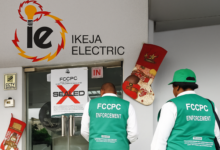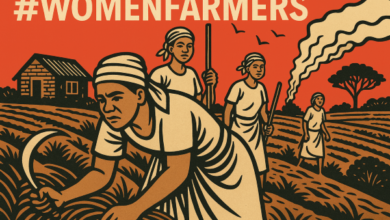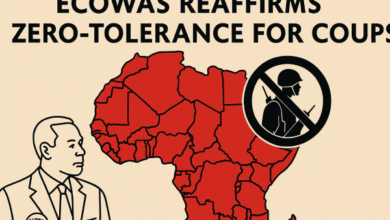How poverty, poor awareness contribute to high prevalence of acute malnutrition in Abuja communities

The Federal Government has been implementing various initiatives to address Severe Acute Malnutrition (SAM) across the country.
Although the principle strategy remains “inpatient” care, there is a growing consensus that Community-based Management of Acute Malnutrition (CMAM) is a crucial approach for achieving widespread, effective coverage and treatment of all children with SAM in Nigeria.
Under CMAM, malnourished children, who are between six months and five years, are given Ready-to-Use Therapeutic Food (RUTF) for about two months. RUTF is a peanut-based paste, which contains milk powder, sugar, and multiple micronutrients.
SAM is real and despite efforts of international organizations like the United Nations Children’s Fund (UNICEF) and the Department for International Development (DFID), in Nigeria, the menace persists.
The stack reality is that the number of children treated only scratches the surface of the problem as more people are either displaced or trapped in their communities in the country.
Sadly, even though malnutrition is the underlying cause for a third of child mortality in the world, it is yet to receive the nature of high-profile campaigning and investment necessary to address it effectively in the Kwali area council of the Federal Capital Territory (FCT).
Poverty, poor knowledge and awareness of malnutrition symptoms, and basic nutritious consumables as well as poor hygiene are some underlying factors equally contributing to the endemic status of acute malnutrition in Nigeria, where gender divisions of labour, gender norms and identities, access to and control over resources, and limited autonomy and bargaining positions within the family and community limit poor women’s ability to use health-care services including during pregnancy, delivery, or children with SAM, the investigation has shown.
The advent of highly-nutritious, ready-to-use therapeutic foods (RUTF) among other key nutrition programmes have helped in saving millions of children from the severest forms of malnutrition, especially in developing countries.
Despite several nutritional programmes launched over a decade ago in Nigeria to stem the scourge of malnutrition in Africa’s most populous nation, progress has been slow; and this has largely been attributed to inadequate local funding and government inactions.
But the prevalence of malnutrition in Nigeria goes beyond government funding. It is ingrained in those structural, cultural and physiological predispositions that hinder many Nigerians from considering nutrition as a priority in the light of other biting priorities.
According to the Nigeria Demographic and Health Survey 2018, the health indices of vulnerable populations are poor: maternal mortality rate is 512 per 100,000 live births, the modern contraceptive prevalence rate is 17 per cent for all family planning methods, the neonatal mortality rate is 39 per 1,000 live births, the under-five mortality rate remains 132 per 1,000 live births which translates to one in every eight children not reaching their fifth birthday.
The Minister, Federal Ministry of Health (FmoH), Dr. Osagie Ehanire, said, “severe malnutrition has also been a factor in Nigeria with 37 per cent of children under five years suffering from stunting, affecting about 12 million children, while 7 per cent of under-five children in Nigeria are wasted; 2 per cent are overweight and 23 per cent underweight.
Ehanire stated that among identified impediments to the attainment of desired health and wellbeing in Nigeria were first of all; lack of functional and affordable health centers that limit physical and financial access, to health care and enlightenment, needed to combat harmful traditional or socio-cultural practices and strengthen the decision-making power to seek appropriate health care before, during and after pregnancy or ill-health.
“Poor awareness of hygiene and sanitation, poor choices in nutrition that omit foods like eggs, beef and fish in the diet of growing children, ignorance of the benefits of modern health services and culturally determined gender role definitions, particularly impact the wellbeing of females and children in some communities.
“The deleterious practices inevitably increase susceptibility to infections, slow down recovery from illness, and contribute to preventable morbidity and mortality rates, especially among women, children and the elderly,” he added.
The Minister said there was the need to strengthen engagement with media institutions and improve strategic communication tools, working with various media platforms to drive social and behavior change communication and influence attitudes towards Reproductive, Maternal, Newborn, Child, Adolescent, and Elderly Health plus Nutrition.
Baby Testimony, two-year-old from Bako, a rural setting in Nigeria’s capital, Abuja, weighs about 6.3kg and can neither sit nor stand on his own. He has so far survived by whiskers from acute malnutrition perhaps by the virtue of his name.
His mother, Mrs Bashira Bulus, said her son’s undernourishment worsened because of late detection and treatment, a situation she blamed on her poor awareness of the symptoms.
Bashira said she had no basic knowledge of childbearing especially because she lost her mother at the age of 13.
Now aged 20, Bashira said she resorted to advise from her neighbors when Testimony developed a chest infection, fever, diarrhea, and was vomiting – some of the common symptoms of severe wasting – the nutritional deficiency that about 13.6 million children around the world suffer from, putting them at 11 times greater risk of death than their healthy peers.
According to the World Health Organisation (WHO), children suffering from severe wasting or Severe Acute Malnutrition (SAM) are not hungry. They have ceased to be hungry, making the disease complex in detection.

Following her neighbor’s advice that her son only stopped eating and took ill because he was trying to grow a tooth, Mrs. Bashira Bulus started administering ‘Baba Aisha’ on Testimony. Baba Aisha is a herbal concoction that heals toothache.
“I took my neighbors’ advice because they are older and more experienced than me in childbearing but unfortunately, Baba Aisha failed and my son’s condition became worst”, she narrated to the News Agency of Nigeria (NAN) correspondent.
The 20-year-old Bashira said it was then that Testimony was rushed to the Primary Health Centre in the community but due to the poor state of the facility, the child was further referred to the Kwali General Hospital.
“When we got to the general hospital, my son did not pass the appetite test and the doctor said he has a major nutrition complication, so we were admitted.
“Sold for about N1,200 per sachet, Bashira said her son was given ‘F75 formula’, a nutritious milk that boosts the recovery of normal metabolic function and nutrition-electrolytic balance which significantly improved Testimony’s health.
“The duration of this milk the doctor told my husband was for 2-7 days until our son is stabilized. Apart from the first two we bought, we could no longer afford this milk after we were discharged from the hospital in December 2021,” she explained.
As she could no longer afford the ‘F75 formula’, Bashira resorted to getting RUTF from the designated CMAM Primary Health Centre in Kwali, but that attempt remained futile as the nutritious food was never available.
“We were referred back to the PHC where we were told that the RUFT was no longer available. The lady there kept on telling me to go and come all the time and I pay N150 to that place for transportation every day,” she narrated.
Although rural communities around Kwali local government area of the FCT is just about a few kilometres from the Abuja main city, many of them are lacking in a lot of essential but basic amenities such as quality health centres, electricity and pipe-borne water.
Due to the timid nature of these communities, many nursing mothers in Kwali and environs are also facing a familiar ordeal as Bashira. The only quality health facility in the area is the Kwali General hospital, that attend to people from Abaji and also Gwagwalada.
Mrs Praise Sunday, a mother of three-year-old triplets, all suffering with SAM, narrated their critical condition as they currently weigh 7kg and are also being treated at the Kwali General Hospital.
Sunday, who is a housewife, said the condition of her triplets had worsened as they could not get the ‘F75 formula’ or medicine needed to help them overcome SAM.
She said she could not also access the free treatment or get the RUTF at the designated CMAM centre in Kwali community because officials at the CMAM centre told her that her triplets have outgrown RUFT.
“I stopped taking my kids to the general hospital because the treatment is no longer free and it’s what we cannot afford compared to the past. Our situation has worsened because previously before the triplets arrived, my husband was working but presently, he hardly finds work,” Mrs Sunday told NAN.
“The situation is painful because the triplets fall sick all the time. They vomit and have diarrhea at the same time.”
Asides the triplets, Mrs Sunday previously had three kids but the mother of six said she had no experience about malnutrition before or seen or known any one with such situation.”
I was very afraid when they were detected with SAM,” she narrated.
The Etsu of Kwali, His Royal Highness (HRH), Alhaji Shaban Audu Nizazo (III), while speaking with a NAN correspondent, shared the story of one Ms Precious, who’s husband ran away after her twin were detected with SAM.
“They brought the matter to my palace so I had to send money to the general hospital for those twins to be treated. Truly treatments for SAM are not free because we paid for that lady,” he narrated, adding that fortunately, the twins survived after receiving treatment.
Nizazo called on the government at all levels to sit up by addressing the crushing indices and causes of malnutrition that have continued to deprive “our children and mothers of a healthy and productive life span.”
The king recommended remedial programmes to support SAM mothers and more support for those in rural farming through input subsidies and high producer prices, improving rural credit schemes.
“Mother’s empowerment is an important indicator of their child’s nutritional status,” he noted.
The Chief Medical Director (CMD) of Kwali General Hospital, Dr. Halima Lawal Bello, stated that job and income insecurity are the primary drivers of the poor outcomes often observed among their pediatric patients.
“Most often, when you ask why this child is malnourished, the mothers will always tell you they do not have enough food to eat, they are not working, and at the end of the month, there is no earning or salary to purchase food for the family. Instead, every day, they go on the hustle to find some kind of work to enable them to find food for their family,” Bello said.

She said that children treated for malnutrition on an inpatient basis were at heightened risk for relapse when they return to a home environment characterized by severe deprivation.
“After discharge from our facility, malnourished children are given RUTFs and/or other supplemental fortified foods for recovery. However, mothers reported that when they returned home with a malnourished child, they were compelled to divide RUTFs supplied by the health facility among other children or family members in the household. In other cases, these rations are sold to meet other needs,” she stressed.
According to her, RUFT programme has ended and also some organizations providing the hospital with F75 and F100 formula, which malnourished children used to get for free, are no longer available. We have to buy the formula and prepare them at the moment and charge a token of about a N1,000 or so. Even at that, parents still need to buy some medicines which they are unable to buy in most cases.
She added that many malnourished children develop burn marks on their bodies and the medicines to treat them are not available for free.
“No one denies that the role of RUFT in helping malnourished people is important, but it doesn’t provide patients with the medicines for scorches and burns.
Bello noted that these children can survive if they are treated on time. But many parents are unable to afford the treatment, sometimes they run away with their children from the hospital, some of them give fake names, and fake home addresses because they are unable to pay their hospital bills.
Nutrition experts attribute the continuous staggering statistics of malnutrition in the country to the government’s lack of specific budget for nutrition and a strategic plan of action.
They said, for instance, a 2018 report by the International Center for Investigative Reporting mirrored how the government has been slashing funds for nutritional programmes designed to save thousands of lives.
They added that the outbreak of COVID-19 in 2020 had equally pushed nutrition further down on the government’s priority list. But advocates warn that the cost of ignoring the ripple effects of malnutrition cannot be quantified in human and economic terms.
Having observed the ordeal mothers such as Mrs Bashira Bulus and Mrs Praise Sunday are subjected to due to poor awareness and poverty, the International Society for Media in Public Health (ISMPH) – an organisation galvanising critical reporting of health-related issues, launched a Media Advocacy/Empowerment Strategy for the Prevention and Management of SAM.
READ ALSO:https://brandeconomy.com.ng/ngo-tasks-policy-makers-on-protection-of-children-with-disabilities/
Meanwhile, with support from the European Union Agents for Citizen Driven Transformation, the advocacy campaign for 2022 is focused specifically in two local government areas of the FCT namely: Bwari and Kwali – where cases of SAM are noted to be prevalent.
“The project will be implemented in Bwari and Kwali local governments and the target is mothers from low-income households in vulnerable communities, uneducated/unemployed/single rural dwelling mothers and mothers living with disability and struggling to provide care for their children,” Mrs Moji Makajuonla, ISMPH Executive Director, said.
Makajuonla, who is also a veteran Journalist, listed some activities of the programme to include: livelihood empowerment programmes for mothers and girls for improved economic well-being, supporting a Media Group for Child Health/Nutrition, empowering the Media for accurate reportage of issues of Nutrition in Nigeria, using waste to wealth methods production of essential oils from local plants among others.
(NAN)










